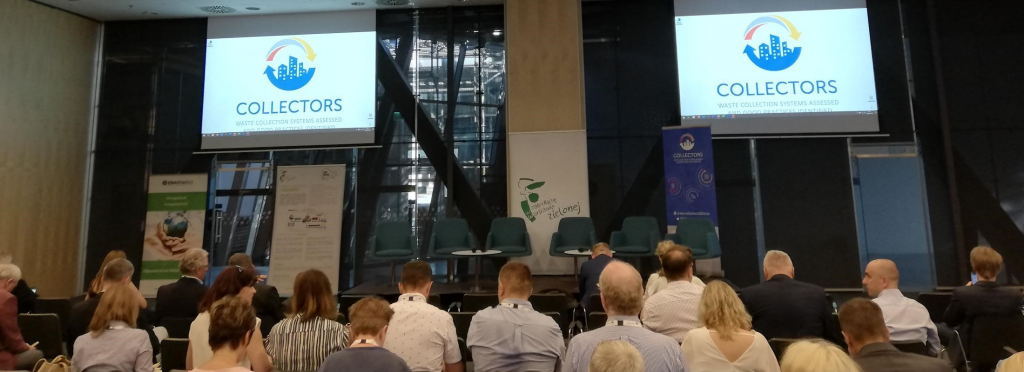
The attendees at the COLLECTORS conference in Warsaw on 26 June also had the opportunity to participate in two master classes that focused on the importance of separate waste collection for two main fractions: paper and packaging waste (PPW) and WEEE. They both started with presentations by the COLLECTORS partners about the results of case study analyses conducted as part of the project into the economic, environmental and circular economy outcomes of separate waste collection for the specified fractions. Afterwards, representatives of the locations featured in the case studies elaborated on the examples during panel discussions. To conclude with, the audience was invited to participate, resulting in an open dialogue among all the stakeholders present about the effectiveness of waste collection systems for the two waste fractions.
Paper and packaging waste (PPW) master class
Encompassing a variety of packaging waste streams, such as glass, plastics, metal and composites, as well as paper, the first session, on PPW, debuted with discussions on the environmental impacts and material flows associated with the separate waste collection of these fractions. COLLECTORS analyses have indicated that approximately 18 million tonnes of such waste could be redirected from landfills if EU collection rates associated with best practices were reached across the bloc. While improved waste collection would be a major contributor towards meeting EU recycling targets, it would be insufficient on its own, the analyses found. Besides, in order to reach the best-case scenario, recycling and sorting efficiencies would have to be optimised.
From the environmental perspective, improving collection would also result in substantial greenhouse gas reductions. However, the conversion rate between the two would not be 1:1, as environmental reductions associated with closing material loops are also associated with recycling and substitution efficiencies.
The analysis from a circular economy perspective showed that, for all packaging waste streams under discussion, clear end-applications requiring high-value recycling had been detected, in contrast to the fragmented collection scope for the different cases per waste stream. The analysis further showed that the level of service provided to citizens, including the collection system and frequency, varied widely depending both on the case and on the waste stream. Even within the same city, different collection systems could be applied for one waste stream as the waste collection is often tailored to the needs of specific areas within the city (e.g. multi-family houses versus detached houses).
During the panel discussion, three experts shared their opinions: Tom Claeys from the City of Gent/IVAGO in Belgium; Ulisse Appiani from the City of Parma in Italy; and Theo Leferink op Reinink from the Municipality of Tubbergen in the Netherlands. All the panelists emphasised the benefits of cooperating with private companies because of their extensive expertise both in the organisation of waste collection and in securing an adequate destination for the collected waste. They also appreciated the insights provided by the case studies, as they would help them to better understand the challenges and benefits of separate waste collection in a broader, recycling value chain perspective.
WEEE master class
The second master class revealed that measures like awareness raising, communication and diversification of waste collection systems in order to improve the collection of WEEE are widely known and used, as substantiated by the analyses of the case studies. Additionally, the need to secure the collected WEEE against possible theft appears to be a more recent, but regularly applied measure to ensure that it ends up at adequate sorting and recycling facilities. The results of the environmental analysis were similar in the WEEE case studies to those in the PPW case studies, although presenters noted that an additional factor should be taken into consideration, namely improved recycling and resource recovery from collected WEEE.
The experts invited to the panel discussion were: Dr. Phillip Morton of WEEE Forum; Dr. Elsa Agante of Electrão, Portugal; Sébastien Partida of Eco-systèmes, France; and Grzegorz Skrzypczak of Elektroeko, Poland. The discussion revolved around two main topics, which were increasing WEEE collection quantities and improving the quality of the sorted WEEE fractions, which would benefit recycling and the recovery of valuable materials. An important piece of data and knowledge gap concerning WEEE collection are the so-called complementary flows, which include for example WEEE that is stored by private households or WEEE that is illegally removed before reaching proper collection channels. Better data on these would help to identify the fate of these flows and their environmental consequences, the panelists concluded.